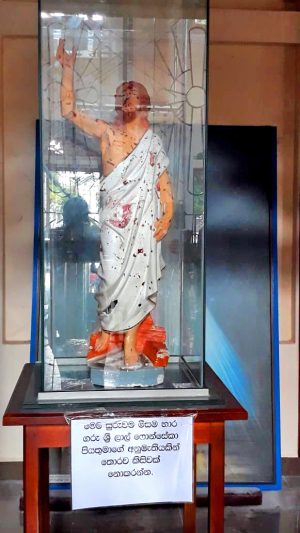On May 20, the Gujarat Anti-Terrorist Squad (ATS) arrested four Sri Lankans suspected to be Islamic State of Iraq and Syria (ISIS) terrorists, at the Sardar Vallabhbhai Patel International Airport in Ahmedabad, India. Three Indian Premier League cricket teams were scheduled to arrive ahead of the 2024 playoffs.
Indian media reported that the four men were communicating with a Pakistani ISIS handler “Abu.” ATS confiscated an ISIS flag and three loaded pistols in the possession of the four Sri Lankans.
The Press Trust of India news agency reported that the four men had a Pakistani handler and that they wanted to target BJP and RSS leaders Nupur Sharma, Rajah Singh, and Updesh Rana for “atrocities against Muslims.”
The four suspects, Mohammed Nusrath Gani (33), Mohammed Nafran (27), Mohammed Faris (35), and Mohammed Rasdin (43), were previously affiliated with the National Thowheeth Jamath, which carried out the 2019 Easter Sunday attacks in Sri Lanka.
Indian media added that the suspects had told the police that they received 400,000 Sri Lankan rupees (around $1,400) to carry out the attacks.
Meanwhile, Sri Lankan police revealed that all four men have criminal records. Nafran is the son of a notorious underworld crime boss named Niyas Naufer aka Potta Naufer. Three of the men are from the inner suburbs of Colombo while the fourth is from Periyamulla, Negombo, near one of the sites of the Easter Sunday attacks. Potta Naufer was sentenced to death for the killing of High Court Judge Sarath Ambepitiya in 2004.
Nafran is a school dropout who was importing fabrics from India. His business had taken him to India and Dubai frequently. Nusrath and Nafran had visited Inda 38 and 40 times, respectively. Nusrath had been arrested previously for gold and drug smuggling, and Rasdin and Faris for drug-related offenses. Sri Lanka’s IGP on Wednesday appointed a committee to investigate the four Sri Lankans.
This arrest comes two months after Assam Police arrested the Indian leader of ISIS, Haris Farooqi, and an associate, Anurag Singh, after they crossed over to India from Bangladesh. Singh, a convert to Islam, has a Bangladeshi wife.
As expected, the arrests have reignited concerns about Islamic extremism in Sri Lanka. The 2019 Easter Sunday attacks are still remembered and are still an election topic. At least two major political parties have formulated strategies to get to the bottom of the attacks and presented them to the Catholic Church.
Several parliamentarians have asked the government what it plans to do about Islamic extremism given these arrests. Former wartime head of Sri Lanka’s Civil Defense Force and Minister of Public Security Sarath Weerasekera said that the threat of Islamic terrorism still prevails in the country as the security establishment has slackened its vigilance on the radicalization of sections of society. Parliamentarian Kavinda Jayawardena also expressed concerns about radicalization in Sri Lanka especially among those traveling frequently to India and Pakistan.
In the past four years, the Sri Lankan government has been preoccupied with the economy. Its focus is on implementing an unpopular IMF program and suppressing those who oppose its economic austerity measures and undemocratic policies. It also plans to downsize the military, and little money is allocated to developing the intelligence services or the technical capacity of the military.
Meanwhile, the threat posed by the Islamic State Khorasan Province (ISKP) to South Asian countries has grown.
While Afghanistan and Pakistan remain the ISKP’s core territory, the jihadist group has shifted its strategy from controlling territory to conducting urban warfare. Over the past two years, ISKP has aimed to disrupt the Taliban’s governance and establish cells in India, Bangladesh, Myanmar, the Maldives, and Sri Lanka. Although only several hundred Indian Muslims have traveled to the Levant and Afghanistan to join the Islamic State, these individuals have significantly impacted domestic networks, serving as vital conduits for advice and communication with the organization in Syria and Afghanistan.
Since the 2008 attack by the Lashkar-e-Taiba in Mumbai, India has been improving its counterterrorism capabilities and managed to restrict the number of attacks carried out in the country. It must also be noted that it was an Indian intelligence operative who had warned Sri Lanka about the impending Eastern Sunday attacks.
On the other hand, Sri Lanka has allowed its intelligence capabilities to deteriorate since the end of the war in 2009. The country has earmarked 58,446 million Sri Lankan rupees ($194.8 million) for capital expenses of the defense ministry for 2024, which is estimated to dwindle to $65.9 million in 2025. Funding for technology and training is even less. The government frequently talks about “right-sizing” the army and plans to drastically reduce troops by 2030.
India also believes that Sri Lanka should right-size the army, which apparently would pave “the way for democracy, civilian administration, and reconciliation.”
However, the government has not clarified the yardsticks and calculations by which it has decided to achieve this. The Maithripala Sirisena administration (2015-2019), in which President Ranil Wickremesinghe was the prime minister, paid scant attention to security and the country suffered the consequences on Easter Sunday of 2019.
In an anarchic international system, the primary objective of the state is survival. Ensuring safety and security is paramount for economic development. The recent arrest of four Sri Lankan ISIS operatives in India underscores the persistent threat of Islamic extremism. Sri Lanka must balance economic reforms with robust defense and intelligence capabilities to safeguard national security and prevent future terrorist activities.

































